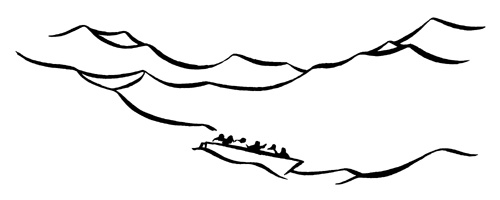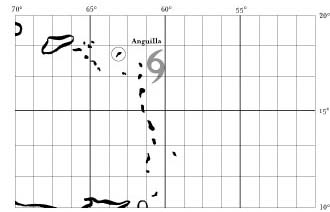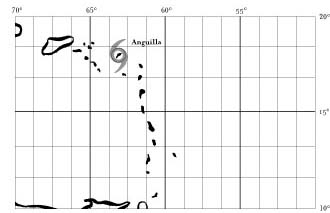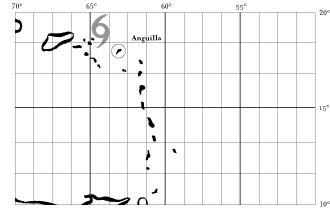A Trip to the Beach (27 page)

The familiar map of the Caribbean appeared on the screenâa sea of blue with a giant mass of swirling orange and red representing the storm. With every new report the mass had moved closer and closer to the islands, and John would take his marker and draw a bold arrow showing its predicted track. His arrow went right from the eye of the storm to Anguilla and St. Martin, around which he would draw a circle.
The meteorologist's words were serious. “This is a dangerous hurricane with sustained winds that are now a hundred and forty miles per hour, with gusts up to one-seventy. It is moving westward and has slowed to ten miles per hour. This could cause further intensification. Luis is currently two hundred miles from Anguilla and St. Martin, and we expect severe damage on those islands. If you are in the warning area, you should be doing your final preparation right now. All windows and doors should be boarded shut, and you should have a good supply of flashlights, extra batteries, a battery-operated radio, bottled water, and nonperishable food. Those of you in low-lying areas should seek shelter on higher ground, as this storm is almost certain to cause serious flooding as well. The storm surge is expected to be as high as twenty feet.”
Pat and I listened intently and wondered what Bob was doing. Luis sounded more serious with each update. It was still three hours before he was scheduled to call us again, so we took a break from the TV and went out for lobster rolls and chowder at Barnacle Billy's, our favorite Maine hangout. We sat outside looking at the quiet harbor filled with boats and tried to imagine what it would be like in a hurricane. There wasn't even a breeze and the water was as calm as a lake.
We stopped at a candy store on the way back to the hotel and filled little bags with old-fashioned penny candy. Watching John Hope repeat the last tropical update information, we ate our bags of caramels and red licorice, waiting for Bob's call. We listened endlessly to statistics about how many storms pass through the Caribbean each year, and predictions that Luis could be the worst in decades. We were becoming hurricane experts.
The phone rang at eleven o'clock, as promised, and Bob gave us a full report. The buffet at Port de Plaisance was comical, he said. All the kitchen help had gone home, so Mr. Spittle and his assistant were in charge. They put out whatever food they could find, and the guests could do what they wanted with it. Bob had made a peanut-butter-and-jelly sandwich, grabbed some potato chips, and sat down on the steps to eat. All the furniture had been moved out of sight.
I felt guilty admitting to Bob that we had enjoyed our dinner and even gone to the candy store. He laughed and said he wished he were with us. We dragged out the phone call as long as possible, trying to ignore the fact that we were both frightened of what was about to happen. Finally, at about ten minutes before twelve, we said our goodbyes. I hung up the phone, glanced at Pat, and realized I was crying.
The electricity went off promptly at midnight, plunging all of St. Martin into darkness. Bob picked up the phone to see if by chance it worked, but it was dead. He lit the two candles on the nightstand next to the bed and tried to read Pat Conroy's
Beach Music,
which I had given to him at the airport. The flickering light made it difficult to concentrate, but the book was gripping enough to keep his attention for a while. He dozed off for about an hour and woke up trying to remember exactly what was going on. With no radio or TV, he had no idea what the storm was doingâonly that it wasn't supposed to hit until the next day around noon. He felt completely alone and stranded.
He got up and went out onto the balcony to see if he could detect any signs of Luis yet, grateful that the heat of the day had finally given way to cooler breezes. He wondered if Mr. Spittle was going to get his sliding door boarded in the morning. It was still relatively calm outside and eerie to see St. Martin so dark. From Anguilla the lights on St. Martin had always reminded us of Las Vegas, and the darkness seemed very strange. The Pond was actually much brighter than the island itself, as the boats stayed lit from their own generators. The lights atop their masts rocked gently back and forth, and several large motor yachts were lit up like floating cities. People were out on their decks laughing and enjoying themselves, and Bob wondered if they were planning to stay on board during the storm. It was two o'clock in the morning, and he decided to call it a night and try to get some rest.
Pat and I slept restlessly with the Weather Channel on the whole night. Every time there was a new update, we'd wake up and watch in disbelief as the storm continued its direct path for Bob.
Chapter 15

SEPTEMBER 5â5 a.m. TROPICAL UPDATE
Location: 61.40 WÂ Â Â Â Â Â 17.40 N
Sustained winds 150 mph
Gusts up to 180 mph
Category 4 hurricane
Moving 10 mph WNW
100 miles from Anguilla/St. Martin
Predicted landfall: 9 hours

Predictions for landfall remained the same. Anguilla and St. Martin would be experiencing hurricane-force winds by around noon. The temperature there was eighty-one degrees and it was raining hard already. I called Jesse early in Washington so that I'd catch him before he went to classes. We had spoken on and off during the past few days, but now that Bob and I were completely out of touch, I thought Jesse and I had better keep in close contact. He said he'd check in with me throughout the day.
Under darkening skies, the pace had picked up around Port de Plaisance and in the harbor. People were still anchoring their boats, securing them in four directions, and shuttling back and forth to land on dinghies. Some were removing valuables from on board, while other die-hard sailors stocked up with supplies, apparently planning to ride out the storm on their boats.
Mr. Spittle and several young boys were throwing all the patio furniture, including tables, lounge chairs, and umbrellas, into the swimming pool. Putting things under water was safer than just leaving them loose around the pool. Bob went over and helped fill the pool with furniture.
“Thanks for your help,” said Mr. Spittle. “We only have a few hours until the storm hits, so I want all guests in their rooms when the winds start to pick up.”
“What else can I do to help?” Bob asked as the last chair sank to the bottom of the pool. “You might as well use me any way you can. I can't just sit here and wait.”
“We're going to walk the grounds one final time to make sure everything is inside.” So Bob, Mr. Spittle, and the young assistants combed the hotel, moving trash cans and potted plants into empty rooms. By eleven-thirty it seemed as though anything that could become airborne was inside.
The sky was dark gray and the wind-driven rain was coming down hard. The wind was gusting more strongly now and came in bursts, carrying the rain horizontally. Bob leaned into it, and when it stopped, he'd have to catch his balance again. Mr. Spittle instructed the guests to go to their rooms and stay there until the storm ended, and Bob went inside to change out of his wet clothes. It was clear by now that his glass doors were not going to be boarded up.
By noon the gusts had turned to fury, and the steady howl of the wind grew louder and more ominous. Bob locked himself in his room and watched in awe from his balcony as the sheets of rain blew across the harbor. The wind was whipping past the front of the railing. Bob felt as though he were sitting in the front row of a movie theater, but he knew that if he got too close to the edge, he might get sucked right out into the storm. He watched, staying three or four feet back from the railing, as Hurricane Luis intensified. The snarl of the wind sounded like Niagara Falls.
SEPTEMBER 5â2 p.m. TROPICAL UPDATE
Location: 62.80 WÂ Â Â Â Â Â 18.00 N
Sustained winds 152 mph
Gusts up to 200 mph
Strong category 4 hurricane
Moving 10 mph WNW
Directly over Anguilla/St. Martin

The trees bent with the wind, and palm fronds were blown straight out to one side. Branches snapped off and flew across the harbor, bouncing off the boats and disappearing into the storm. By three o'clock visibility was almost nonexistent, and it was very hard to tell what time of day it was. The light was grayish black, and thick walls of horizontal rain blocked any view in front of the balcony.
In between the sheets of rain, boats occasionally appeared and disappeared from sight. Each time Bob caught a glimpse of one of the boats, it would be in a different position. The mast on the closest sailboat looked as though it was almost touching the water, first on one side and then on the other.
One of the smaller motor yachts broke away from its mooring and smashed into a fifty-footer next to it, chewing a hole in its bow, until the gash got so big, the boat began to take on water. Wedged against the dock, the smaller yacht pounded against the larger, over and over. Finally it snapped its remaining line and broke free, moving down to the next boat and crashing into it with such force that a corner of the third boat was ripped off completely.
The rogue boat, having destroyed two others, was now loose in the harbor and heading straight toward the Shell fuel station at the end of the pier. At the last instant it veered off to the left and crashed into the dock, ripping a large hole in its bow. As water started to flood the cabin it listed to one side and then sank, leaving only the roof of the cabin poking out of the water.
Bob stared at the big Shell sign, wondering how much fuel was in the pumps and where the fuel tanks were. He hoped the tanks were buried up onshore somewhere, so even if a boat did hit the pumps, the worst that could happen would be a bad spill, not an explosion.
The largest yacht was now sinking too as the hole in its side let in more water. Its stern was dipping lower and lower until water swept over the deck and filled the cabin. About a third of the roof remained in sight as the rest was dragged under. Bob tried to guess how much these two boats were worth and pictured insurance adjusters arguing with the owners over million-dollar claims. He shuddered as he envisioned the damage Blanchard's might be sustaining on Anguilla.
A sailboat came into view to the right of the fuel dock, having apparently broken its anchor lines; the sleek blue-and-white craft was being blown toward shore. It ran aground just beyond the fuel dock and tipped over on its side, snapping the mast in half. As soon as the broken half of the mast hit the ground, the wind picked it up like a toothpick, and it was gone. Bob wondered what damage that mast might cause and pictured it flying through the air like a spear. The water level had risen at least six feet and now covered the dock and parts of the path that wound around the resort.
As the wind increased, it began to snap palm trees like twigs, sending the tops careening through the air as if they were weightless. A piece of red galvanized roofing flew right by Bob's balcony and disappeared out into the harbor. Bob had heard earlier warnings on the news about galvanized roofing coming off and turning into flying razor blades, slicing through anything in their path. Several more pieces blew by, this time skipping across the water. Each time a piece touched down, a spray of salt water would shoot up into the air and mix with the rain, becoming horizontal like everything else.
As the pieces of roofing danced their way across the water and disappeared into the storm, Bob peeked around the corner of his balcony to see where they were coming from. One of the hotel's restaurants was a West Indian-style building built right on the pier, and Bob watched as Hurricane Luis dismantled it. The sheets of metal roofing were being peeled off like paper. Pieces of plywood came off next, leaving a skeleton of rafters exposed. The wind rushed into the building. In one swift, sharp move, the roof was ripped apart, rafters and all, and exploded into the air, disappearing into the storm. With the inside of the kitchen now completely exposed, Bob watched as glasses, dishes, pots, and pans joined the rest of the building's debris. Now airborne missiles, they smashed into the boats, breaking windows and shattering wood. Pieces of wood sheared off lampposts and snapped palm trees like giant power saws. The sound of the wind masked the racket of crashing boats and breaking glass. Bob's mind filled with images of Blanchard's being destroyed the same way.
Within minutes, the only thing left of what was once a charming little building was a cement block wall that had been the back of the kitchen, and a few pieces of heavy equipment, including the range and grill. A stainless-steel refrigerator had tipped over on its back, and both doors had been ripped off; bottles of wine were being sucked out and were flying through the air and into the harbor. The refrigerator skidded along the pier like an empty cardboard box, finally tipping over the edge and sinking from sight.
Bob thought of the wine cellar in Blanchard's. He pictured his bottles of 1982 Château Margaux getting sucked out to sea.
SEPTEMBER 5â8 p.m. TROPICAL UPDATE
Location: 63.01 WÂ Â Â Â Â Â 18.00 N
Sustained winds 150 mph
Gusts up to 200 mph
Strong category 4 hurricane
Moving 4 mph W
Directly over Anguilla/St. Martin

The Weather Channel update at eight o'clock that night reported at least twelve deaths on St. Martin, and I was going out of my mind not being able to talk to Bob. I called the Red Cross, hoping they knew something. I always thought they were on top of all emergency situations, but the woman I spoke with didn't even know there was a hurricane.
Doesn't she watch the Weather Channel?
I fumed.
Frustrated, I called the Vermont state police, thinking it was their civic duty to help me get accurate information on damage, injuries, and maybe the names of any Americans reported dead or missing. The officer was sympathetic and suggested finding someone with a ham radio. He said that was the only way of communicating in a situation like this. After a dozen or so phone calls, I found myself talking to the president of a ham radio club, who listened to my story and then politely said, “I'm sorry, ma'am. Our radios don't reach the Caribbean.”
It was hopeless. We just had to wait for Bob to call. Pat tried to keep me smiling, but as the hours went by, I imagined the worst. I was sure Bob was too stubborn to lie in a bathtub with a mattress over him. In fact, knowing him, I wouldn't have been surprised if he was outside taking pictures.
Pat and I slept again with the TV on all night. We set our alarm and woke up every three hours for the latest coordinates on the storm. It was hardly moving. John Hope made it clear that Luis was pounding Anguilla and St. Martin with sustained winds of 150 mph and gusts up to 200. The forward motion had slowed to a painful 4 mph, and it would be another twenty-four hours before Luis moved on to its next target. Extreme damage was predicted.